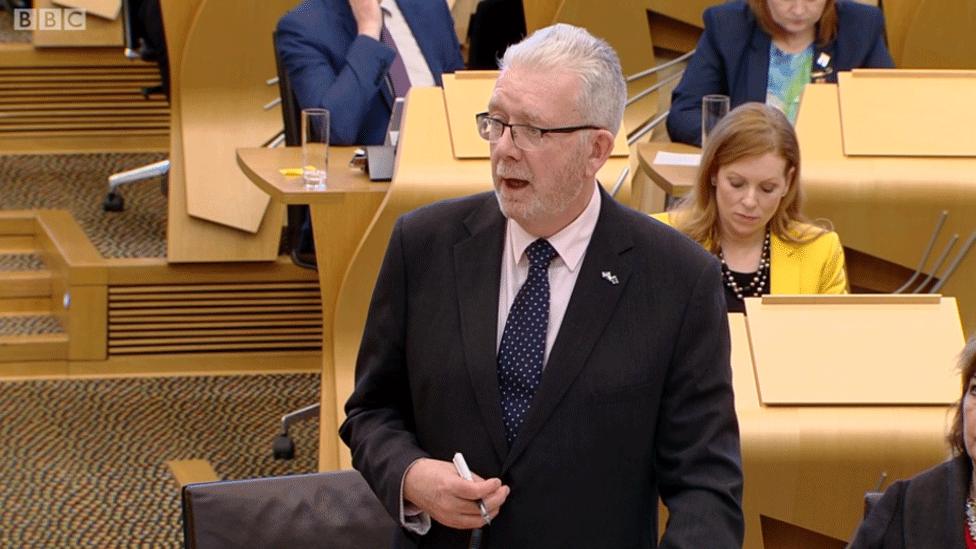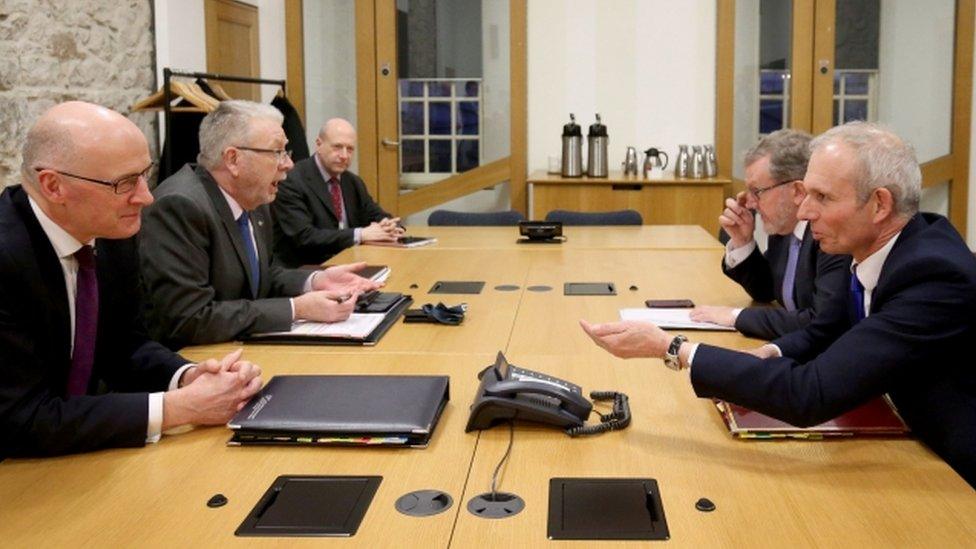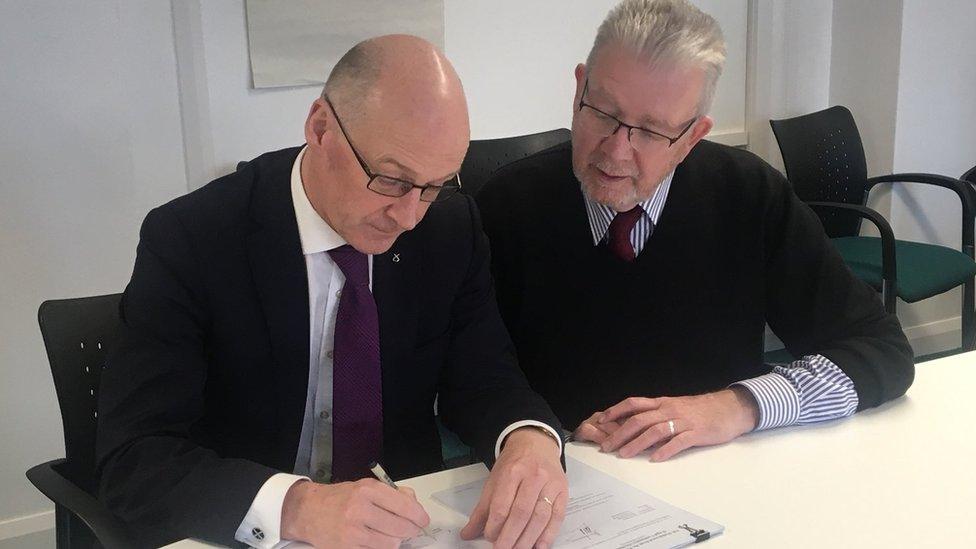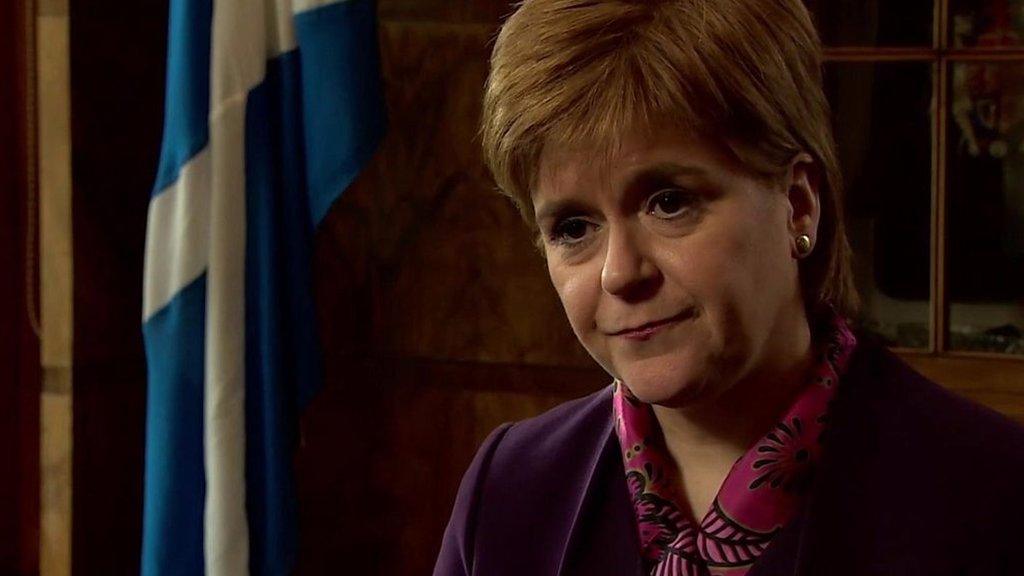Scottish government publishes alternative Brexit bill
- Published

Scotland's Brexit minister Mike Russell said the clock was ticking and the continuity bill was necessary at this time
Scottish ministers have tabled their own alternative to the EU Withdrawal Bill at Holyrood.
The Scottish and UK governments are locked in a dispute over sections of the Westminster bill relating to devolved powers.
A continuity bill has been introduced at Holyrood, external as a stop-gap solution if MSPs do not consent to the UK bill.
However, the presiding officer has not backed the move, saying it is not for Holyrood to legislate on.
Scottish ministers "respectfully disagree", and are to press ahead with the legislation anyway.
The UK Withdrawal from the European Union (Legal Continuity) (Scotland) Bill has now been formally introduced at Holyrood.
It is an alternative to the EU Withdrawal Bill, focused on devolved matters, to be used in the event that MSPs do not give their consent to the Westminster legislation.
The Scottish government says there was still scope for a deal to be agreed with Westminster, but has rejected the current offer from UK ministers.
Cabinet Office minister David Lidington said on Monday that he had made a "considerable offer" to the devolved administrations, involving "significant" changes to the legislation.
But First Minister Nicola Sturgeon said she "will not sign up to something that effectively undermines the whole foundation on which devolution is built".

Talks between the two sides earlier this month ended without any deal being agreed
Presiding Officer Ken Macintosh announced that he does not believe it currently falls within Holyrood's remit, which may leave the legislation open to legal challenge if it is passed.
He said the bill "anticipates the impact of the withdrawal of the United Kingdom from the European Union", and as such "assumes that the parliament can make provision now for the exercise of powers which it is possible the parliament will acquire in the future".
He said that as it stands, the bill "would not be within the legislative competence of the parliament".
However, this was opposed by Lord Advocate James Wolffe, the government's top legal advisor, who will address MSPs on Wednesday.
He said the bill had been "carefully framed so that it does not do anything or enable anything to be done while the UK remains a member of the EU", meaning it should not fall foul of EU law.
He said: "It is compatible with EU law to make provision, in the way that this bill does, for what is to happen when EU law no longer applies."
'Emergency timetable'
Mr Russell told MSPs that he would "respectfully disagree" with Mr Macintosh, saying the Lord Advocate was happy for it to go ahead.
And he noted that a similar bill tabled at the Welsh parliament had the backing of Mr Macintosh's opposite number in Wales.
He said: "If the UK government drops its power grab then it may still be possible to reach agreement, in which case we would not need to proceed with the continuity bill.
"But we are proposing this bill should be put through on an emergency timetable to ensure it becomes law in time to make the necessary preparations."
Mr Russell also said his preferred option would be to find a way of amending the Westminster legislation to the satisfaction of both governments, something welcomed by Scottish Secretary David Mundell.
The MP said: "We have made a considerable offer to the devolved administrations on amending the EU Withdrawal Bill, and look forward to further constructive talks."

Deputy First Minister John Swinney signed the bill alongside Mr Russell
Scottish Conservative constitution spokesman Adam Tomkins said the bill was "unwelcome and unnecessary", saying that "the SNP are inviting Holyrood to rush through illegal constitutional legislation for which there is no need, when the UK and Scottish government are within spitting distance of agreement".
Labour's Neil Findlay said the UK government's handling of Brexit had been "shambolic", saying his party would oppose "attempts to undermine" devolution.
Scottish Green co-convener Patrick Harvie welcomed the bill, saying it should proceed "even if the UK government offers a last-minute compromise".
Lib Dem Tavish Scott said it was "not satisfactory" that there was no agreement over the legality of the bill, asking for "further opportunities" for MSPs to scrutinise the legal basis for the bill.
Devolved powers
The introduction of the continuity bill, which would deal with the sections of the EU Withdrawal Bill relating to devolved areas, is the latest stage of a long-running row between the UK and Scottish and Welsh governments over post-Brexit powers.
Ministers are at loggerheads over how powers currently exercised in Brussels are divided up after the UK leaves the EU.
All agree that certain powers will be incorporated into UK-wide frameworks, but there is dispute over who will have final oversight of this, with UK ministers arguing that they should have the final say in some cases to "protect the essential interests of businesses and consumers in every part of the kingdom".
Mr Russell contends that this amounts to Westminster "using Brexit to try to take control of devolved powers without the agreement of the Scottish Parliament".
- Published27 February 2018
